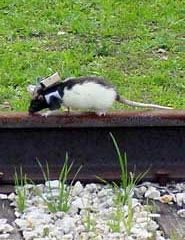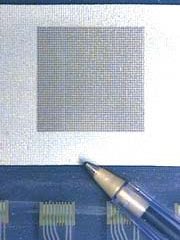Latest News

Here come the Ratbots
Desire drives remote-controlled rodents.
Remote-controlled rats could soon be detecting earthquake survivors or leading bomb-disposal teams to buried land mines.
Signals from a laptop up to 500 metres away make the rats run, climb, jump and even cross brightly lit open spaces, contrary to their instincts. The rodents carry a backpack containing a radio receiver and a power source that transmits the signals into their brains through electrical probes the breadth of a hair.

LCD paint licked
Walls and curtains could sport liquid-crystal digital displays.
Homes of the future could change their wallpaper from cream to cornflower blue at the touch of a button, says Dirk Broer. His team has developed paint-on liquid crystal displays (LCDs) that offer the technology.
Liquid crystals are peculiar liquids: their molecules spontaneously line up, rather than being randomly orientated as in a normal liquid. Passing a voltage across the molecules switches their alignment, b

Was Frankenstein a Scotsman?
An article in the May issue of Journal of the Royal Society of Medicine suggests that much of the medical inspiration for Mary Shelley’s legendary novel Frankenstein came not from central Europe, but from a retired Scots physician living in Windsor. Christopher Goulding, a postgraduate student at the University of Newcastle upon Tyne, bases his claims on his PhD research into the scientific interests of the novelist’s husband, the poet Percy Shelley.
Most criticism of Mary Shelley’s much-in

Fatty diets or high alcohol intake during pregnancy may lead to diabetes in children
Fatty diets or high alcohol intake during pregnancy may lead to diabetes in children
Women who consume a high fat diet or who drink significant amounts of alcohol during pregnancy may increase the risk of their child developing diabetes as an adult according to a study in the current edition of the Journal of Endocrinology.
A team led by Dr Sam Pennington of the Department of Biochemistry, Brody School of Medicine at East Carolina University has found that insulin resistance,

Early exposure to common viral infection does not protect against allergy
Common viral infections in early childhood do not protect against allergy, concludes research in Thorax. If anything, the evidence points to an increased risk.
The findings contradict the increasingly popular if general theory that the rise in prevalence of allergies and asthma is partly attributable to the fact that children are less frequently exposed to viral infections early in life – the so-called ‘hygiene hypothesis.’
The research focused on 889 pregnant Danish women, who wer

Peptic ulcer surgery increases the risk of pancreatic cancer
Peptic ulcer surgery seems to increase the risk of developing pancreatic cancer, finds research in the Journal of Clinical Pathology.
Pancreatic cancer is the fifth leading cause of death from cancer, largely because the prognosis is so poor.
Dutch researchers monitored the progress of 2633 patients who underwent surgery for the removal of a peptic or duodenal ulcer between 1931 and 1960. A preliminary analysis suggested that these patients had double the risk of developing pancrea










